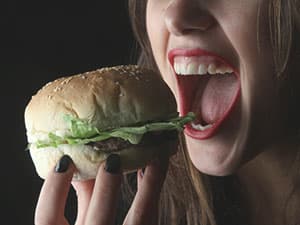Food Addiction
 In recent years, the scientific community has begun to more closely study compulsive behaviors such as gambling, sex, video games, and eating. Research suggests something more complex may be at play in some people than simply overeating.
In recent years, the scientific community has begun to more closely study compulsive behaviors such as gambling, sex, video games, and eating. Research suggests something more complex may be at play in some people than simply overeating.
Foods full of fat and sugar can supercharge the brain’s reward system similarly to the way addictive drugs do. They can override the brain’s normal ability to tell an individual to stop eating. When this happens, a person may want to eat more and more.1
Although food addiction is not formally considered an eating disorder, it is receiving increasingly more attention as a serious problem that many people struggle with.
This article will cover the following:
- The definition of food addiction
- Signs and symptoms of food addiction
- Causes of food addiction
- Short-term and long-term food addiction effects
- Depression and food addiction
- Food addiction statistics
- How to find help for food addiction
What Is Food Addiction?
With a food addiction, a person is unable to stop eating despite consequences such as weight gain and health risks.12
Like drug addiction, food addiction can also lead to cravings, tolerance, and even withdrawal. For example, a study using high-tech brain imaging scans looked at the brains of abnormal versus normal eaters when they saw a milkshake. Researchers found that the addicted eaters responded to the milkshake the same way that alcoholics respond when shown a cold beer.3
Researchers involved in a recent groundbreaking food addiction study say that those who score high on the food addiction scale report needing to eat larger and larger quantities of food to achieve the same emotional effect (tolerance). For many people, they say, thinking about anything other than food can become very difficult – to the extent that it affects their social and professional lives.3
Who Gets Addicted?
People overeat and become obese for many reasons. Just like people who drink or smoke marijuana, not everyone becomes addicted. Recent studies have tried to pinpoint what makes people addicted to food different than people who binge eat. The distinction is an important one, because it directly relates to food addiction treatment. Be proactive about your health. Gauge your food habits with an Eating Disorder Quiz.
For example, when addiction is the underlying cause of obesity, traditional treatment with diets that rely on personal responsibility or “willpower” may not be sufficient. Because food stimulates the reward center in the brain, many psychologists believe it must be treated in the same way as any other addiction. They believe that lifestyle changes and even gastric bypass surgery will have minimal effect unless the underlying addiction is addressed.3
Food Addiction Signs and Symptoms
A major advancement in the study of food addiction is the Yale Food Addiction Scale (YFAS). This scale was developed to identify people who are exhibiting signs and symptoms of food addiction.4
The YFAS is the first diagnostic criteria of its kind, designed to resemble the official diagnostic criteria for substance use disorders outlined in the Diagnostic and Statistical Manual of Mental Disorders (DSM). The YFAS attempts to measure the extent to which people binge on specific foods despite repeated attempts to stop or slow down, whether their eating behaviors interfere with their lives, and the extent to which they experience withdrawal symptoms when they abstain from certain foods.5
Major food addiction signs and symptoms include:
- Eating larger amounts and for a longer period of time than intended.
- Experiencing a persistent desire or repeated unsuccessful attempts to quit.
- Spending a great deal of time obtaining food, eating it, and recovering from overeating.
- Giving up or reducing important social, professional, or recreational activities.
- Continuing to overeat despite knowledge of adverse consequences (weight gain, nausea, diabetes).
- Needing larger amounts of food over time to achieve the desired emotional effect (tolerance).
- Experiencing withdrawal symptoms (intense cravings, feeling stress/anger, depression) when abstaining from overeating.4
If you or someone you know shows signs of food addiction, call to learn more about treatment options.
Causes of Food Addiction
Food addiction has many suspected causes. Research has shown that addiction has a genetic component, but other factors may cause food addiction.

- Emotions and stress. People who become addicted to food may eat to enhance positive emotions and to reduce negative emotions.5 For example, you might eat a pizza to “reward yourself” for an accomplishment, but you might also eat a pizza because something bad happened and “you deserve it.” This is classic addictive thinking.
- Brain chemistry. Foods that are rich in fat and sugar can alter the reward centers of the brain in the same way as drugs and alcohol. The presence of high-sugar foods reduced self-administration of cocaine and heroin in rats trained to press a lever to receive intravenous drugs. The rats preferred the “natural” high from sugar to the high from drugs.2 This study shows that sugar might actually have a stronger effect on the brain’s reward system than these drugs.
- Genetics. Another food addiction cause may be genetics. A 2002 study found that women with a family history of alcoholism had a 49% higher chance of obesity than those without a family history.6 Although not everyone with obesity has a food addiction, this suggests that there may be a relationship between alcohol addiction and food addiction.
- Trauma. A study of women with PTSD found that women with the greatest number of PTSD symptoms had more than twice the prevalence of food addiction as women with no PTSD symptoms or no history of trauma. When the trauma and onset of PTSD symptoms happened at an earlier age, the relationship to food addiction was even stronger.7 This suggests that women who experienced a childhood trauma may be at greater risk of food addiction.
Short-Term Food Addiction Effects
Anyone who has binged on food knows the physical short-term effects of food addiction. These can be very uncomfortable and can include:
- Upset stomach.
- Heartburn.
- Extreme nausea.
- Vomiting.
After the initial physical effects of overeating, many women describe an immediate onset of psychological symptoms. Following a binge, many women describe severe emotional distress, using words such as “ashamed,” “guilty,” and “disgusted.”8 This psychological distress often led women to eat more to try to make themselves feel better.
Long-Term Food Addiction Effects
When you consistently eat far more than intended, you are likely to gain weight. For many Americans, weight gain can be distressing because they do not look like the celebrities and models they see on television, so they feel unattractive.
But it’s the long-term effects of food addiction and obesity that can be especially dangerous and costly. They include:
- Type 2 diabetes.
- High cholesterol.
- Coronary heart disease.
- High blood pressure.
- Stroke.
- Sleep apnea.
- Depression.
- Osteoarthritis.
- Cancer.
- Reproductive problems.
- Gallstones.9
Food addiction tends to get worse the longer it’s left untreated. Call to get help finding a recovery program.
Depression and Food Addiction
Studies suggest that there is a solid link between food addiction and negative emotional states, including depression and anxiety. For example, adults and adolescents with binge eating disorder or bulimia nervosa have shown a higher prevalence of major depression, bipolar disorder, anxiety disorders, and substance abuse than individuals without an eating disorder. Obese individuals also have higher rates of major depression.5
Perhaps most alarming is the connection between suicidal ideation and binge eating. More than half of teenage bulimics and a third of those with binge eating disorder report suicidal ideation. 5 This suggests that binge eating, as people often do when they are addicted to food, may be related to extreme emotional distress.
Finding a food addiction treatment program that will address these underlying emotional problems is critical to a healthy recovery.
Food Addiction Statistics

-
- More than 5% of the population may suffer from food addiction, according to one study.10
- Food addiction occurs in almost 7% in women and 3% in men.10
- Food addiction occurs in 2% of under/normal weight people and 8% of overweight/obese people. 10
- Women between 45-64 years old have an 8.4% prevalence rate, while those between 62-88 years old have a 2.7% prevalence rate. 11
Help for Food Addiction
Do you recognize any of the food addiction signs or symptoms in yourself or someone you know? It might be time to seek treatment. Your insurance provider may help cover eating disorder treatment.
Our treatment support advisors can help you find a food addiction treatment program that fits your needs and your budget. Call our helpline today at 1-888-344-8837 to speak with an advisor about your options.
Read next: Food Addiction Treatment Programs
Sources
[1]. Kenny, P. (2013). Is obesity an addiction? Scientific American.
[2]. Olsen, C. M. (2011). Natural rewards, neuroplasticity, and non-drug addictions. Neuropharmacology, 61(7), 1109–1122.
[3]. Helliker, K. (2011). Food may be addicting for some. The Wall Street Journal. April 5.
[4]. Gearhardt, A., Corbin, W. & Brownell, K. (2012) Yale food addiction scale (YFAS)
[5]. Parylak, S. L., Koob, G. F., & Zorrilla, E. P. (2011). The dark side of food addiction. Physiology & Behavior, 104(1), 149–156.
[6]. Grucza R.A., Krueger R.F., Racette S.B., Norberg K.E., Hipp P.R., Bierut L.J. (2010).The emerging link between alcoholism risk and obesity in the United States. Arch Gen Psychiatry. 67(12):1301-1308.
[7]. Mason, S.M., Flint, A.J., Roberts, AL, et. al. (2014). Posttraumatic stress disorder symptoms and food addiction in women by timing and type of trauma exposure. JAMA Psychiatry. Nov;71(11):1271-8.
[8]. Curtis, C., Davis, C. (2014). A qualitative study of binge eating and obesity from an addiction perspective. Eating Disorders Vol. 22 , Iss. 1.
[9]. National Institutes of Health. (2012). What are the health risks of overweight and obesity?
[10]. Pedram, P., Wadden, D., Amini, P., Gulliver, W., Randell, E., Cahill, F., … & Ji, Y. (2013). Food addiction: its prevalence and significant association with obesity in the general population. PloS one, 8(9), e74832.
[11]. Flint, A. J., Gearhardt, A. N., Corbin, W. R., Brownell, K. D., Field, A. E., & Rimm, E. B. (2014). Food-addiction scale measurement in 2 cohorts of middle-aged and older women. The American journal of clinical nutrition, 99(3), 578-586.
[12]. Food Addiction Institute. What Is Food Addiction?
